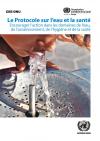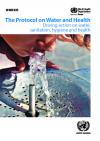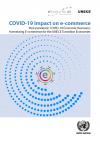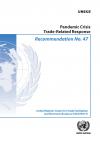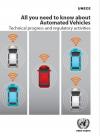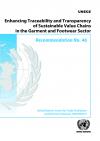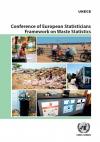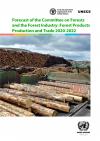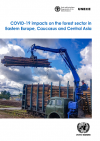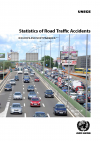Publications
Displaying Results 241 - 260 of 2779
- English
The Inland Transport Committee (ITC) of the United Nations Economic Commission for Europe provided countries with the ITC Recommendations for Enhancing National Road Safety Systems (“ITC Recommendations”), adopted at its eighty-second session (ECE/TRANS/2020/9).
These recommendations give a comprehensive picture of national road safety systems that includes all key elements at the national level
- English
The calendar covers selected findings on greening the economy and financing environmental protection from 16 environmental performance reviews (EPRs) conducted in the period 2012–2021, and additional updated information provided by countries.
By disseminating the results of the EPRs in the form of a calendar for the upcoming year, UNECE aims to draw attention to the findings of the reviews and
- Pусский
Протокол ЕЭК ООН-ВОЗ/Европа по проблемам воды и здоровья является юридически обязательным международным соглашением для стран общеевропейского региона. Его цель — обеспечение охраны здоровья и благополучия человека за счет устойчивого управления водными ресурсами, а также посредством предотвращения и ограничения степени распространения заболеваний, связанных с водой.
Данная публикация
- Français
The UNECE-WHO/Europe Protocol on Water and Health is an international legally binding agreement for countries in the pan-European region. Its objective is to protect human health and well-being through sustainable water management and by preventing and controlling water-related diseases.
This publication provides an introduction to the Protocol on Water and Health, presenting its core provisions
- English
The UNECE-WHO/Europe Protocol on Water and Health is an international legally binding agreement for countries in the pan-European region. Its objective is to protect human health and well-being through sustainable water management and by preventing and controlling water-related diseases.
This publication provides an introduction to the Protocol on Water and Health, presenting its core provisions
- English
The COVID-19 pandemic has sunk the global economy into the deepest recession in decades and continues to take an unprecedented toll on human health and life. In an effort to contain and prevent the spread of the disease, governments across the globe, imposed restrictions on movement. Border closures and partial or full lockdowns became the new normal in many parts of the world. The pandemic and
- English
Recommendation 47 outlines measures to mitigate the adverse impact of a pandemic such as COVID-19 on trade flows. Such pandemics have revealed the challenges of facing a health crisis and its impact on society and economies which could potentially leave lasting scars on the global economy.
Download:
- English
Full Report – Road Safety Performance Review ZimbabweSummary of Findings and Recommendations
As a consequence of road traffic crashes, an estimated 1.35 million people die and more than 50 million
- English
Transportation demand is forecasted to triple by 2050. Keeping track of that intensification of transportation is imperative for all supply chain stakeholders. Motivated by factors such as operational efficiency standards, competitive pressures, heightened customer expectations and governmental regulations, both public and private organizations are searching for mechanisms to reduce risks by
- English
This brochure focuses on the automotive sector developments and governmental responses, as well as provides insights on the activities’ development performed by intergovernmental bodies of UNECE to enable assisted and automated driving as of September 2021. It further includes a short section aimed at providing clarity about various myths.
- English
Improving traceability and transparency has become a priority for the garment and footwear industry. Consumers, governments, and civil society are demanding responsible business conduct and are calling upon the industry to identify and address actual and potential negative impacts in the areas of human rights, the environment, and human health.
By creating enhanced visibility in value chains,
- English
UNECE Group of Experts on Coal Mine Methane and Just Transition striving to help countries with lowering the carbon footprint of their coal industries developed in partnership with the Global Methane Initiative (GMI) the Best Practice Guidance for Effective Management of Coal Mine Methane at National Level: Monitoring, Reporting, Verification and Mitigation. The document aims to assist member
- English
Official waste statistics have been produced for more than 40 years. They were initially developed to monitor and manage threats to human health and the environment. More recently, information needs have shifted toward realizing the economic value of waste, particularly in the context of the “circular economy”. This change has created demand for information on waste types that have not
- English
This publication is the statistical supplement to the official statement by the Committee on Forests and the Forest Industry about the current and next year's forest products markets. The tables in the publication show detailed forest products production and trade forecasts by country for 2021 and 2022. The tables are generated based
- English
This report summarizes the impacts that the COVID-19 pandemic had during 2020 in the forest sector of the countries in Eastern Europe, the Caucasus and Central Asia (EECCA) (Armenia, Azerbaijan, Belarus, Georgia, Kazakhstan, Kyrgyzstan, Moldova, Russian Federation, Tajikistan, Turkmenistan, Ukraine and Uzbekistan), focusing on production, export, import, consumption, prices and employment for the
- English
This publication provides comparable data on road traffic accidents in Europe, Canada and the United States. Data are organized by the nature of accident, and the number of persons killed or injured, by category or road user, age group and sex. As background data, figures on the number of road vehicles in use and vehicle-kilometers run by road vehicles are also provided along with estimates of
- English
Which users may use the water of a lake, river or other source? For what purposes, in what quantity and of what quality? Where and when?
These are the questions answered by ‘water allocation’ which is the process and/or outcome of determining how different stakeholders use water. With growing water scarcity around the globe, determining such water use presents a major challenge – and even more so
- English
This high-level policy recommendation advocates to governments the importance of building national capacity and capability to cope with a large influx of humanitarian relief. The sudden onset of a disaster often results in relief providers and national administrations being unclear about importation requirements and procedures for needed relief items. These items may include lifesaving relief




